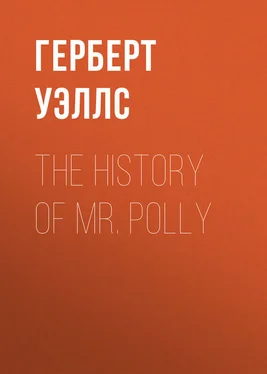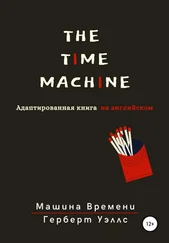Герберт Уэллс - The History of Mr. Polly
Здесь есть возможность читать онлайн «Герберт Уэллс - The History of Mr. Polly» — ознакомительный отрывок электронной книги совершенно бесплатно, а после прочтения отрывка купить полную версию. В некоторых случаях можно слушать аудио, скачать через торрент в формате fb2 и присутствует краткое содержание. Жанр: foreign_antique, foreign_prose, на английском языке. Описание произведения, (предисловие) а так же отзывы посетителей доступны на портале библиотеки ЛибКат.
- Название:The History of Mr. Polly
- Автор:
- Жанр:
- Год:неизвестен
- ISBN:нет данных
- Рейтинг книги:5 / 5. Голосов: 1
-
Избранное:Добавить в избранное
- Отзывы:
-
Ваша оценка:
- 100
- 1
- 2
- 3
- 4
- 5
The History of Mr. Polly: краткое содержание, описание и аннотация
Предлагаем к чтению аннотацию, описание, краткое содержание или предисловие (зависит от того, что написал сам автор книги «The History of Mr. Polly»). Если вы не нашли необходимую информацию о книге — напишите в комментариях, мы постараемся отыскать её.
The History of Mr. Polly — читать онлайн ознакомительный отрывок
Ниже представлен текст книги, разбитый по страницам. Система сохранения места последней прочитанной страницы, позволяет с удобством читать онлайн бесплатно книгу «The History of Mr. Polly», без необходимости каждый раз заново искать на чём Вы остановились. Поставьте закладку, и сможете в любой момент перейти на страницу, на которой закончили чтение.
Интервал:
Закладка:
H. G. Wells
The History of Mr. Polly
Chapter the First
Beginnings, and the Bazaar
I
“Hole!” said Mr. Polly, and then for a change, and with greatly increased emphasis: “’Ole!” He paused, and then broke out with one of his private and peculiar idioms. “Oh! Beastly Silly Wheeze of a Hole!”
He was sitting on a stile between two threadbare looking fields, and suffering acutely from indigestion.
He suffered from indigestion now nearly every afternoon in his life, but as he lacked introspection he projected the associated discomfort upon the world. Every afternoon he discovered afresh that life as a whole and every aspect of life that presented itself was “beastly.” And this afternoon, lured by the delusive blueness of a sky that was blue because the wind was in the east, he had come out in the hope of snatching something of the joyousness of spring. The mysterious alchemy of mind and body refused, however, to permit any joyousness whatever in the spring.
He had had a little difficulty in finding his cap before he came out. He wanted his cap – the new golf cap – and Mrs. Polly must needs fish out his old soft brown felt hat. “’ Ere’s your ’at,” she said in a tone of insincere encouragement.
He had been routing among the piled newspapers under the kitchen dresser, and had turned quite hopefully and taken the thing. He put it on. But it didn’t feel right. Nothing felt right. He put a trembling hand upon the crown of the thing and pressed it on his head, and tried it askew to the right and then askew to the left.
Then the full sense of the indignity offered him came home to him. The hat masked the upper sinister quarter of his face, and he spoke with a wrathful eye regarding his wife from under the brim. In a voice thick with fury he said: “I s’pose you’d like me to wear that silly Mud Pie for ever, eh? I tell you I won’t. I’m sick of it. I’m pretty near sick of everything, comes to that… Hat!”
He clutched it with quivering fingers. “Hat!” he repeated. Then he flung it to the ground, and kicked it with extraordinary fury across the kitchen. It flew up against the door and dropped to the ground with its ribbon band half off.
“Shan’t go out!” he said, and sticking his hands into his jacket pockets discovered the missing cap in the right one.
There was nothing for it but to go straight upstairs without a word, and out, slamming the shop door hard.
“Beauty!” said Mrs. Polly at last to a tremendous silence, picking up and dusting the rejected headdress. “Tantrums,” she added. “I ’aven’t patience.” And moving with the slow reluctance of a deeply offended woman, she began to pile together the simple apparatus of their recent meal, for transportation to the scullery sink.
The repast she had prepared for him did not seem to her to justify his ingratitude. There had been the cold pork from Sunday and some nice cold potatoes, and Rashdall’s Mixed Pickles, of which he was inordinately fond. He had eaten three gherkins, two onions, a small cauliflower head and several capers with every appearance of appetite, and indeed with avidity; and then there had been cold suet pudding to follow, with treacle, and then a nice bit of cheese. It was the pale, hard sort of cheese he liked; red cheese he declared was indigestible. He had also had three big slices of greyish baker’s bread, and had drunk the best part of the jugful of beer… But there seems to be no pleasing some people.
“Tantrums!” said Mrs. Polly at the sink, struggling with the mustard on his plate and expressing the only solution of the problem that occurred to her.
And Mr. Polly sat on the stile and hated the whole scheme of life – which was at once excessive and inadequate as a solution. He hated Foxbourne, he hated Foxbourne High Street, he hated his shop and his wife and his neighbours – every blessed neighbour – and with indescribable bitterness he hated himself.
“Why did I ever get in this silly Hole?” he said. “Why did I ever?”
He sat on the stile, and looked with eyes that seemed blurred with impalpable flaws at a world in which even the spring buds were wilted, the sunlight metallic and the shadows mixed with blue-black ink.
To the moralist I know he might have served as a figure of sinful discontent, but that is because it is the habit of moralists to ignore material circumstances, – if indeed one may speak of a recent meal as a circumstance, – with Mr. Polly circum . Drink, indeed, our teachers will criticise nowadays both as regards quantity and quality, but neither church nor state nor school will raise a warning finger between a man and his hunger and his wife’s catering. So on nearly every day in his life Mr. Polly fell into a violent rage and hatred against the outer world in the afternoon, and never suspected that it was this inner world to which I am with such masterly delicacy alluding, that was thus reflecting its sinister disorder upon the things without. It is a pity that some human beings are not more transparent. If Mr. Polly, for example, had been transparent or even passably translucent, then perhaps he might have realised from the Laocoon struggle he would have glimpsed, that indeed he was not so much a human being as a civil war.
Wonderful things must have been going on inside Mr. Polly. Oh! wonderful things. It must have been like a badly managed industrial city during a period of depression; agitators, acts of violence, strikes, the forces of law and order doing their best, rushings to and fro, upheavals, the Marseillaise , tumbrils, the rumble and the thunder of the tumbrils…
I do not know why the east wind aggravates life to unhealthy people. It made Mr. Polly’s teeth seem loose in his head, and his skin feel like a misfit, and his hair a dry, stringy exasperation…
Why cannot doctors give us an antidote to the east wind?
“Never have the sense to get your hair cut till it’s too long,” said Mr. Polly catching sight of his shadow, “you blighted, degenerated Paintbrush! Ugh!” and he flattened down the projecting tails with an urgent hand.
II
Mr. Polly’s age was exactly thirty-five years and a half. He was a short, compact figure, and a little inclined to a localised embonpoint . His face was not unpleasing; the features fine, but a trifle too pointed about the nose to be classically perfect. The corners of his sensitive mouth were depressed. His eyes were ruddy brown and troubled, and the left one was round with more of wonder in it than its fellow. His complexion was dull and yellowish. That, as I have explained, on account of those civil disturbances. He was, in the technical sense of the word, clean shaved, with a small sallow patch under the right ear and a cut on the chin. His brow had the little puckerings of a thoroughly discontented man, little wrinklings and lumps, particularly over his right eye, and he sat with his hands in his pockets, a little askew on the stile and swung one leg. “Hole!” he repeated presently.
He broke into a quavering song. “Ro-o-o-tten Be-e-astly Silly Hole!”
His voice thickened with rage, and the rest of his discourse was marred by an unfortunate choice of epithets.
He was dressed in a shabby black morning coat and vest; the braid that bound these garments was a little loose in places; his collar was chosen from stock and with projecting corners, technically a “wing-poke”; that and his tie, which was new and loose and rich in colouring, had been selected to encourage and stimulate customers – for he dealt in gentlemen’s outfitting. His golf cap, which was also from stock and aslant over his eye, gave his misery a desperate touch. He wore brown leather boots – because he hated the smell of blacking.
Читать дальшеИнтервал:
Закладка:
Похожие книги на «The History of Mr. Polly»
Представляем Вашему вниманию похожие книги на «The History of Mr. Polly» списком для выбора. Мы отобрали схожую по названию и смыслу литературу в надежде предоставить читателям больше вариантов отыскать новые, интересные, ещё непрочитанные произведения.
Обсуждение, отзывы о книге «The History of Mr. Polly» и просто собственные мнения читателей. Оставьте ваши комментарии, напишите, что Вы думаете о произведении, его смысле или главных героях. Укажите что конкретно понравилось, а что нет, и почему Вы так считаете.

![Герберт Уэллс - The War of the Worlds [С англо-русским словарем]](/books/26611/gerbert-uells-the-war-of-the-worlds-s-anglo-thumb.webp)










